Georges De Nantes
The Mystical Doctor of the Catholic Faith
1. A PREDESTINED CHILDHOOD
CANON Patritti's gentle and lilting voice rose in the chapel of the baptismal font of Saint-Louis' Church in Toulon. He was the parish priest and dean of this church that was called ‘the naval oratory.’ “ And this one, Commander, will we not make a priest of him?” Commander de Nantes immediately consented to this call of the Church:
“ Well! Canon, if it is the will of the Good God, we give him to Him. It would be a great honour for us.”
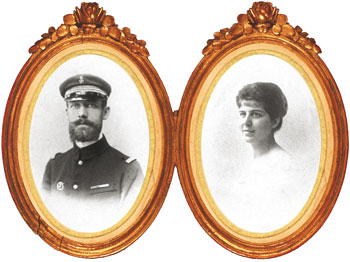
Georges de Nantes' parents.
The vocation of Georges, Marie, Camille de Nantes dates from the day of his baptism, April 5, 1924, so clear was it that he never experienced any turmoil or hesitation about it. This sign of predestination is linked to another: that of being born on April 3 1 into the family of Marc de Nantes and Marguerite de Joannis de Verclos, the third of five children.
“Man is born into a family and can never forget it,” he wrote. “Those who brought him into the world and preserved his life are even more necessary to him when, advancing in existence, he feels the need of living for others and of devoting himself to his great task. Modern individualism attempts to persuade man that he depends on no one, that he owes gratitude to no one and that he is free. The mystery of the family is an obstacle to this lamentable delirium of pride […]. The rich past from which we come gives form to the future that we are making.” 2
If this is especially true “of Mother Church, of the Catholic community that is our family,” it is also true of our natural families, the cradle of our education. The family of Georges de Nantes is particularly rich in traditions.
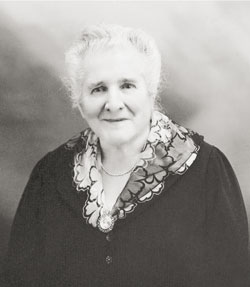
His maternal great-great-uncle, Viscount d'Aboville, was one of the most faithful followers of the Count of Chambord, and his grandmother, the Marquise de Verclos, never made any compromise in matters of her monarchic legitimacy, in spite of the Pope's rallying to the French republic; His great-uncle d'Aboville, an officer of the 4th office of the staff headquarters, was one of the first to suspect Captain Dreyfus of being the author of the famous bordereau 3; as for his father and mother, ‘Roman Catholics and French forever,’ they did not flinch from their double loyalty when, in 1926, Action française was condemned by Pope Pius XI.
“My father was admirable then. His convictions remained steadfast since no reproach really touched them. Fear for the salvation of the Fatherland obliged him to remain faithful to Action française, which alone henceforth, isolated and weakened, devoted itself to the political defence of the nation. He guarded himself, however, from all rebellion, all invectives, and was fond of repeating to us the maxim of Maurras: ‘It is a very tiny matter in the history of the Church and of her age-old blessings.’ Faithful to the true defenders of the country, he nevertheless remained faithful to the Church, respectful towards its members and ready to be subjected to all the sanctions that they would see fit to impose on him. He made every effort to transmit his faith and convictions to us children without prematurely warning us about the discord from which he suffered. In the Catholic schools to which he entrusted us, we sometimes heard it said that our father was a heretic and schismatic, and yet we knew no one in our family circle who was more devoted and generous to the works of the Church, scrupulous in his faith and obedience, respectful towards these same priests who said that he was excommunicated!” 4
Thus was it that our Father could write: “In my cradle, I found the essence of what were to be my joys and crosses in this life but, I hope, my glory in the next.” 5
THE TRUE VALUE OF THINGS.
Rochefort, Bizerte, Toulon, Brest, following the postings of Commander de Nantes, marked the successive stages of a happy childhood
“Toulon, around the year 1934, was dazzling in its beauty. There was the beauty of the sea and of the mountains nearby in this maritime Provence, with its wealth of colour to keep a young child wide-eyed with wonder, its strong scents, the cicadas's intoxicating chirping in the dry heat of the olive trees, and the murmur of running water flowing in the irrigation canals below the walls of cypress trees and along the plane-tree lined avenues. One only had to climb to the top of Mount Faron to behold a most wonderful view.
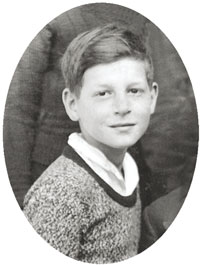
“ Thus, he belonged to the Navy as a monk belongs to his Order; he carried out its work scrupulously, was submissive to its exacting discipline with absolute determination… Certainly he never held prominent posts, nor participated in outstanding missions, nor did he receive rapid promotions. Like several others, this lack of success was due to the fact that he never concealed his religious faith and also to his extreme uprightness that fled favours and discouraged others from proposing some intrigue to him.”
(Letter to My Friends no. 165, February 23, 1964)
“The images come back to me now, crisp and clear as all Mediterranean beauty must be. It was a silent, almost motionless, harmony of nature, civilisation and the nation in a state of dazzling perfection. The town lay at our feet and farther off were the port and the naval yard. In the harbour, the warships were moored to their buoys, prudently spaced. Their lines were totally aesthetic, like so many recumbent greyhounds, sleeping with only one eye shut, ready to sprint [...]. Why was I never tempted by all this enthusiasm and fervour to become a sailor, a naval officer? Why is it that the worn, threadbare, shiny cassocks of the good Marist Fathers moved me far more than did the blue uniform and gold-braided cap of the senior officer?
“Fundamentally, it was because our parents possessed, to a rare degree, the gift of knowledge whereby they knew and felt strongly the true value of things, or if you wish, the essential vanity of things.” 6
The child spontaneously partook in that feeling:
“How can a child thus weigh the world and find it light?”
Answer : he was a predestined child.
He had fond memories of the Marist Fathers of Toulon, and of all the educators to whom he and his brothers were entrusted, and he wrote of them with emotion: “It was they who ended up producing whatever good there is in me.” 7
“At Toulon, there was no dishonour in getting a bad mark; the Fathers were more concerned with Christian formation and piety… Let us say that they allowed the little children to come to them. And I loved them; how could I do otherwise? Fr. Giraude, whom I have never seen again, had for me, as soon as I saw him, the face of Jesus Himself and from that day I loved and respected him as Jesus on earth. The terrible Fr. Bousquet, who had a way of twisting your ears to pull you to your knees in the corner and make you cry out, had such good, gentle eyes that all his ferocity was immediately forgiven [...]. The one I loved best was Fr. Nodet. Since he had an immense and tender devotion to Our Lady, it was transfused into me.” 8
In “this pure joy of the earthly paradise,” the child nevertheless heard echoes of the great combat of Hell against Heaven. 9
“The Corpus Christi procession for the year 1936 was to be the finest of them all. Fr. Roman had built an altar of repose out of plywood in the children's playground, the like of which had never been seen [...]. We were at the foot of this magnificent repository. While we were singing the Tantum Ergo, we had to contend with another refrain competing against the hymn of adoration to Jesus the Host. From the Place de la Liberté, close by, there came the strident and menacing tones of the striking dockyard workers bellowing out the Internationale, as we sang our hymn. I can hear the words in my ear now : The Inter-nationa-a-ale will be the whole human race!
“France was beautiful; there is no doubt about it. The families we met at the naval beach were certainly very distinguished and pleasant to meet. The fleet was doubtless the world's most powerful. When the crews paraded down the Boulevard de Strasbourg followed by the Senegal Rifles and accompanied by military music and rows upon rows of glorious flags, we trembled with pride. Oh yes, it was all very beautiful. Yet spilling over, and churning all these precious things as though they were so much flotsam and jetsam on the waves, the Internationale was stronger still. Its hatred left the world of that time disarmed, and some unknown intimate grace allowed me to perceive it.
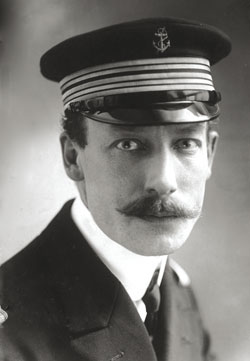
“Alone above our heads, there existed the white Host in the gold monstrance, Jesus Christ true God and true man, our hope and strength, before Whom Commander de Nantes doffed his gold-braided cap and knelt in true adoration – before Him for Whom alone it is good to live and for Whom alone it is worth dying. I knew that I would be a priest and that in so doing, I was entering the service of the one Master Who never disappoints, or rather, the Only One Who is above to command and steer His ship to port, all flags flying and victorious.” 10
This little Provençal was all eyes, all ears. They were open to the beauty of the beings who surrounded him and who plunged him into admiration. He was a mystical soul: the eyes of his heart focused straightaway on the most luminous point of his world, on Jesus the Host, source of all beauty, all life and all wisdom.
THE CHILD WHOM THE FATHER CHERISHES ABUSES HIS GOODNESS.
The mark of the authenticity, of the truth of this mystical life is that, in his Memoirs and Anecdotes, he took care to point out the shadowy passages of his account, which came from his vices as a rebellious child, a cheating child. His purpose in so doing was to highlight the salvation that the Holy Eucharist brings to the sinful souls, to the common souls among whom he humbly placed himself. Thus, when he evoked Bizerte, where he was only four years old, our Father relates:
“It was in this childhood paradise that I committed my first sin. All its physical and moral details are present to my mind unchanged after exactly fifty years.
“ ‘At ten o'clock you will give these three cookies to Bruno,’ Mama told me just as she was going out shopping.
“It was not long before I wanted those miserable cookies. I thought they could be shared. Bruno was playing on the carpet. Two for me because I am big and one for him because he is little. I cannot see his dear face, because it started to change, from day to day, until the last time I saw it: so gentle and beautiful, asleep in the expectation of the resurrection. 11 It was then that the Devil inspired me with infamy. I calculated: Bruno is too young to say anything to Mama so there is absolutely no risk. Then I calmly gave him one cookie and we sat down together to eat our cookies.
“The voice of conscience told me: ‘Robber! Wicked, cruel, heartless brother!’ I held it tight, however, and stifled it. Mama came back and then, as foreseen, a lie was added to the previous crime. I already knew what sin was and I had heard of mortal sin. At midday I began to wonder what I would feel as life slipped away from me. I thought I was going to die. Despite my enormous sin, my humours held firm in the afternoon and a further thought added its malice to the shameful doings of that fateful day: the thought occurred to me that no one could die of that and I began, alas my God, to fear sin not quite so much.
“That is how transgression lodged itself in my heart amid the flowers and fruits of my paradise of Bizerte, driving its treacherous wedge between Mama and me, Bruno and me, God and me. As I was not a good boy with a pure and tender heart I never confessed to Mama, I had no tears of repentance and it was not until the distant day of my first confession, a long while after, that I made an avowal of it.” 12
When he was fourteen years old: the episode of the “bread without salt, special diet bread,” which he bought in contraband at the bakers, is also delightful!
“Once, Mama sent me on errands to Roches-de-Condrieu. I went enthusiastically. It took ten minutes to reach Saint-Prim, a steep hill down through the vineyards of the Cotes-du-Rhone, and then the errands. It was very pleasant. At the bakery I was fascinated by a lovely golden coloured loaf of bread, the crust of which I could already feel between my teeth.
“ ‘Anything else?’
“I pointed out the object of my concupiscence to the baker. She was surprised:
“ ‘That is special diet bread.’
“Plunging deeper still into my lying, theft and effrontery I said:
“ ‘Yes, that's it.’
“ ‘Twenty-five sous.’
“There was time to cross Saint-Clair and then sit down on a low wall amidst the vines to enjoy my lovely crusty bread, feeling a little ashamed, all the same, at this solitary pleasure. Alas! The bread was without salt: it was special diet bread! It was nice and crusty but tasteless; and there I was, punished. I tried to persuade myself that it was good, and that a snack without taste is by that token without sin. It was stifling and I forced myself to eat it. What I could not eat I put in my saddlebag and went home. In the kitchen, I lied about the price of the butter and of the meat, became confused and blushed, but they believed me. The following days I had to eat the remainder of those wooden hard crusts, in my room, on top of my holiday homework. Punished for having sinned. Then this little mocking, light voice that I detest, because it is better than I am, said within my heart: Serves you right, idiot! Diet bread! Confession on Saturday.” 13
Thus it was that the sacraments of the Church – the continual succession of Confessions and Communions – formed a strong soul, a soul set apart. The very wise, lucidly attentive and exceptionally energetic education of his mother was not foreign to it either.
“A SON OF YOUR SERVANT.”
“ Mama curbed my senseless appetite for writing letters and receiving them from friends :
“ ‘ Your ministerial mail ! '
“ She also restrained my itching to go out, to meet other people among whom I felt at ease, and my habit of not returning on time :
“ ‘ What is this ? You are only coming back now ! ’
“ I would bury my head in a newspaper :
“ ‘ Lay the table first ! ’
“ After a time, it was all very tedious. But for whom ? I was much loved, so I was surprised, saddened and irritable when I was not loved, when it was I who thwarted the flow of love with my incessant scenes. ” 14
So it was until this loved son confided in all truth : “ What her eyes did not want to look at (my passions, illusions, superficial bonds), what filled them with worry and tears, my God, You know it, I dismissed them. If we go forward in this way, surrounded by countless virtuous persons under Your eye, it is because all those whom I love had donned the wedding-garment, and merited the affection of my mother. ” 15
The education of the heart goes hand in hand with that of the will. For example : “ I hear you again in 1937, in 1938 and in 1939, the same refrain : “ ‘ This afternoon, ’ – oppressive heat ! – ‘ we could ’ – in the conditional tense ! – ‘ tear the ivy off the wall of the terrace ? ’
“ You're not serious ! Do you want to kill us !
“ ‘ We can always do a little, until snack time. Come along ! ’
You took the pruning shears, and each of us some old tool or other. You put on your ugly, worn-out, leather gloves with holes in the fingers, and you seized ivy creepers clinging to the rock, endlessly rooted in them. You pulled, and we pulled ; you cut, and we pruned. Exhausting ! One would say that it amused you ! We slowed down, we squabbled ; and you continued alone, your face red, replacing a hundred times the same lock of hair that fell into your eyes. What put you in such a frenzy ?
“ ‘ Well ! It had to be done, because the ivy was eating into the old walls. ’
“ Another example, and it was quite another matter : ‘ You cut down the large linden tree near the gate ; that's good but we will have to uproot the stump. ’ Mama, it's sheer madness ! We can't! ‘ Why of course we can, come along… ’
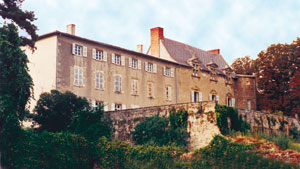
“ There you were going at that stump unrelentingly with a sort of fury, a hatred : Death to the stump ! We were forced to follow, like galley slaves, digging around it, chopping the enormous roots with nicked felling axes, pulling, tearing out. It lasted months, a whole summer. You finally got the better of it. You got the better of us too, because in the end we finally developed a liking for it. Then, at 4 o'clock, a big slice of bread, a chocolate bar, and really cool water from the fountain. It was good ! ” 16
By her alacrity and her continual joyfulness, Mrs. de Nantes succeeded in giving her child the taste for truth and flight from all that is vain. Thus it is that, in his memory, the family manor in Chônas would remain " not a house of correction but of education, where everything was according to the heart of my mother, and behind and near by, the heart of my father, that spoke to me of the Heart of God. ” 17
A SAVING BOREDOM.
“ The holidays were long in those days, from the first of July till the first of October and they were monotonous. Apart from the wonderful break when we went to see grandmother in the Morvan, we spent the holidays at Chônas. On our return from Glux, holiday homework had to replace holiday fun. Chônas is on the hills bordering the plain of Vienne. It is a village of no particular charm with this one large manor house all to ourselves, the beauty of which seemed to me ordinary then as though everyone had his family manor ! There were four of us boys to be livened up by a little sister, who arrived later and who charmed and softened us with her tenderness and perpetual gaiety.
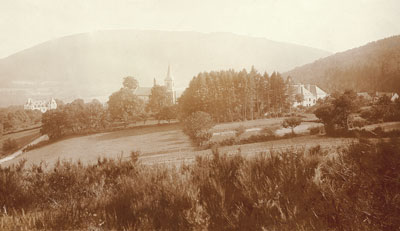
“ The holidays at Glux were the times of greatest happiness when everything was delightful and charming… the morning Communion and now Jesus in the tabernacle, at this moment, all for me. ‘ Jesus I love you ! ’ It was as real and as sweet as saying goodnight to Grandmother and kissing her with all my heart. ”
“ For my mother, a naval officer's wife, left for most of the time to cope with everything alone, it was hard to look after, entertain and educate us. And so every year, she used to call over from Morocco Mademoiselle Otaola to act as governess for this sometimes unruly group. Looking back over those fifteen successive summers, I retain warm memories of simple, happy, family holidays with just a touch of boredom, like the patina of old furniture, encrusted, and why ? It was a saving boredom. Let us see. ”
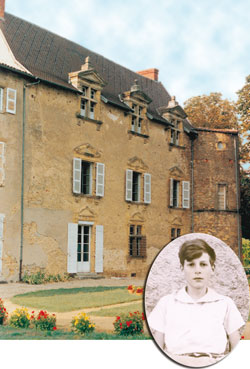
“ I love Chônas as the place of my education, firm and just, tenderly watched over by the best of mothers. ”
Besides heavy work “ that would give us a hunger and thirst ”, besides the harvest with which we helped the men of the farm, there was the inescapable holiday homework. “ How tiresome it was, but why ? Today I ask myself why because I remember the pleasure and the interest I found in reading the subjects, on approaching texts to be translated or problems to be solved. As soon as I sat down to it, however, a cape of laziness paralyzed my brains and I spent hours on easy exercises that my brother Pierre would do in five minutes making child's play of it all.
“ Finally, a shout : Midday ! The Angelus rang deliverance and too bad if nothing was done ! I would catch up tomorrow. Lunch was then a feast. Always. Mama was of an unalterable good humour, she who had toiled in the kitchen and at the housework, she who never stopped all through the holidays and who liked to involve us in the hardest work. Never did the necessary scolding leave the least resentment in her. Once caught, punished, fault expiated, all was forgotten. We spoke of other, interesting and instructive, things. Especially when Papa was at home, our meals were full of charm, interest and gaiety. It was there that I learned effortlessly the beginning and the end of all I know. ” 18
IF THAT IS HOW HEAVEN IS…
“ On the lovely evenings of summer, we used to sit tightly packed on the library bench beneath the windows of Papa's study – the old stone would still be hot from the midday sun. We would watch nightfall, the stars lighting up in the sky, and in the distance the cars coming back to Lyon, like a glow-worm there on the main road. Years later we would sit like that and watch the allied planes machine-gun the German convoys, ebbing away in retreat. We often talked of war, the threat of which, although invisible to others, was perceptible to us. Papa would walk up and down the terrace with a confidant for the evening, and we would watch him until there was no more to be seen but the red tip of his cigarette slowly gliding in the night. With our hands in his – oh, those gestures of discreet tenderness – and he would tell us his memories of Madagascar and of the years before the First World War, or else he would philosophise, and the depth of his faith made us love him all the more and admire him immensely. ” 19
Later on, our Father would see in this family harmony, admirably organised into a hierarchy and vitalised by filial love, the symbol of the divine Trinity, and he would celebrate it in an unforgettable “ Mystical Page ” :
“ The one speaks with an admirable serenity; the other listens and only responds with another question, or to repeat and prolong his father's thinking. Without desk, teacher's lectern, doctor's biretta or ferule, this is a symposium between master and disciple, an understanding between two spirits made for each other, the one engendered by the other with flesh and blood. The word Father is very beautiful and majestic; the word Son is no less so, streaming as it does with the same honour. Both savour the same truths, to the extent that the father pulls them from the mass of his memories and reflections and the son grasps them and gathers them so as never to forget them… They would be happy to converse like that until dawn with long moments of silence, their perfect accord not even seeking for words. ” 20
Before a third person, “ the link between them ”, supervenes. That, however, is quite another story.
“ The children used, to go to bed at nine o'clock. They did not want to go at all. The parents gave in once and then again to the gentle supplications to stay up just a little longer. Finally, we kissed everybody, yes, we all kissed one another, even those who had squabbled and fought that same day. It was a rite that we never missed just as we never failed to kiss one another at table the following morning. Even if you felt like biting this old brother who..., you contented yourself with miming a gesture half bite, half kiss of pardon. Like the family prayers, it put everything back in place and restored peace of heart, through the gentle force of institutions wherein the deepest things are expressed without regard for the whims and disorders of the moment. ” 21
(1) On the same day Madame Royer, to whom the Sacred Heart made revelations, died.
(2) Letter to My Friends no. 37, summer 1958.
(3) In 1894, an obscure trainee in the French army staff headquarters, Captain Alfred Dreyfus, was “justly condemned in accordance with the law” for having delivered military secrets of paramount importance to the Germans. Dreyfus' writing was identified on the bordereau containing a handwritten list of five top secret dossiers. This verdict was confirmed by a court-martial in Rennes (1899).
Turmoil skilfully orchestrated by a “syndicate” formed of Dreyfus' family, friends and supporters soon began to turn France against her Army, by means of a series of disinformation campaigns proclaiming the innocence of the condemned man and calling for the revision of his trial.
This, however, had little effect so long as the sacred institutions of France, her Ministry of Justice, her Army and her government remained unimpeachable.
The situation dramatically changed on August 31, 1898, when Colonel Joseph Henry, a prestigious officer of the French Intelligence Service, allegedly “committed suicide” in prison after having been accused of introducing a “fake” document into the Dreyfus file.
Right, which had been the privilege of Catholic, royalist and communitarian France until that day, no longer seemed to be on that side.
The propaganda of the French revolutionary left-wing, which controlled the press, state education and soon even the government, impressed on the nation's soul the idea that truth and law were on the side of the antimilitarist and anticlerical left wing.
In 1906, Dreyfus' sentence was quashed by a new court decision that forbade any future reopening of the case. This was a complete abuse of authority.
Father de Nantes is one of the very rare persons of his generation to have kept “the knowledge of the facts and an ardent sentiment of French honour.” Colonel Henry had in fact been assassinated in his prison cell after having fallen into the snare laid by the Dreyfusard syndicate. Our Father proved this by a detective analysis of the facts. He discovered the source of the famous “Henry's fake” in the Dreyfusard syndicate's headquarters. The demonstration is implacable and two conclusions can be drawn from it :
A. “In the superior domain of truth and justice, after August 31, 1898 nothing changed, nothing will ever change. Dreyfus is guilty, the Army knows this to be true, Justice will proclaim this in accordance with the law each time it is given the opportunity to do so. Holy Church and true France are intimately convinced of this. In the Devil's camp his henchmen would never ever stop appealing to public opinion against the truth, to the government against justice, to the establishment's historians against the facts, constantly bringing up new hypotheses to replace previous ones that were just as vain.”
B. “ Yet, what did change on that August 31, 1898 and what immediately triggered a series of tragedies was that the left-wing loudly availed itself of the alleged injustice and falsehood of the right to win over to its cause little by little the whole republican establishment and gradually to obtain from it the violation of our rights, our laws, our institutions with impunity and cynicism. All of France's misfortunes for more than a hundred years must be considered ‘Dreyfus' revenge’ (declaration made by Charles Maurras during his trial). ”
(4) “ Commander de Nantes, my Father, ” Letter to My Friends no. 165, of February 23,1964.
(5) The Catholic Counter-Reformation in the 20th Century no. 88, October1977, p. 4.
(6) Memoirs and Anecdotes, Vol. I, pp. 67-70, published in CCR no. 146, May 1982.
(7) CCR no. 146, May 1982, pp. 18-19
(8) Memoirs and Anecdotes, Vol. I, p. 63, published in CCR no. 145, April 1982.
(9) He is Risen no. 14, October 2003, p. 15.
(10) Memoirs and Anecdotes, Vol. I, pp. 71-72, published in CCR no. 146, May 1982, p. 19.
(11) He devoted to this beloved brother, Bruno de Nantes, who died like a predestined soul on October 6, 1966, two very beautiful pages, in Letter to My Friends no. 235, pp. 6-7.
(12) Memoirs and Anecdotes, Vol. I, pp. 44-45, published in CCR no. 110, May 1979.
(13) Ibid., p. 84, published in CCR no. 148, July 1982, p. 19
(14) Ibid., p. 82, published in CCR no. 148, July 1982, p. 18
(15) Mystical Page no. 4, “ Lord, I am the son of Your servant ” ( 2e ed. 2010 ), p. 21.
(16) Mamine, p. 106-107. This delightful collection of Fr. de Nantes' memories of his mother were published by the Community after Mrs. de Nantes' death on October 10, 1988.
(17) Memoirs and Anecdotes, Vol. I, p. 82, published in CCR no. 148, July 1982, p. 18
(18) Ibid., p. 73-76, published in CCR no. 147, June 1982, pp. 18-19.
(19) Ibid., p. 79, published in CCR no. 147, June 1982, pp. 18-19.
(20) Mystical Page no. 38, “ If that is how Heaven is ”, pp. 177-181, published in CCR no. 267, May 1994, pp. 9-10.
(21) Memoirs and Anecdotes, Vol. I, p. 80, published in CCR 147, June 1982, p. 19.